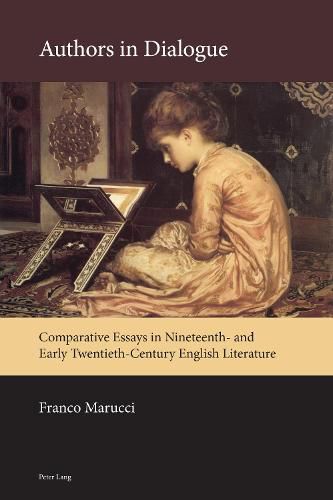Readings Newsletter
Become a Readings Member to make your shopping experience even easier.
Sign in or sign up for free!
You’re not far away from qualifying for FREE standard shipping within Australia
You’ve qualified for FREE standard shipping within Australia
The cart is loading…






This title is printed to order. This book may have been self-published. If so, we cannot guarantee the quality of the content. In the main most books will have gone through the editing process however some may not. We therefore suggest that you be aware of this before ordering this book. If in doubt check either the author or publisher’s details as we are unable to accept any returns unless they are faulty. Please contact us if you have any questions.
Franco Marucci seems to have read everything written in the century between Byron and James Joyce. The breadth and depth of this reading provides steady illumination of topics familiar and unfamiliar, and brings many new things to light. Professional erudition and persistence turn up many trouvailles and not a few truffles. A notable addition to scholarship. (Michael Alexander, Emeritus Professor of English, University of St Andrews)
A remarkable collection of essays, displaying a far from common theoretical acuteness acting on dauntless erudition. Marucci’s explorations of the
Franco Marucci traces a fascinating trajectory that invites us to rethink the works of iconic English authors at the intersection of two centuries. The compelling questions in this collection insightfully reinterpret a literary and cultural transition which, with its multifaceted tensions between tradition and innovation, continues to speak to us. (Nicoletta Pireddu, Professor of Italian and Comparative Literature, Georgetown University)
Authors in Dialogue is, therefore, a much-welcomed compendium that gathers many eminent contributions to comparative studies which, now that they are presented together, communicate with each other in intriguing ways and reveal even more thoroughly the author’s critical acumen and coherent system of reasoning. (Fabio Bazzano, Univ. di Pavia, Review in Il confronto letterario, no. 75)
This book gathers together essays and papers written over a time span of around fifteen years. Partly retitled and revised, they were selected for the book because they all focus on the dialogic element in a series of literary works produced in the period extending from late Romanticism to early Modernism. By dialogic the author means the sharing of common preoccupations, the recursiveness of motifs, themes and patterns, the emergence of constants, a network of explicit or hidden confrontations. Dialogues may then arise between an author and other contemporaries in the form of an explicit theoretical discussion in letters or critical essays; or implicitly, and allusively, in inventive negotiations that respond to previous works through parody or adaptation. After a concise introduction stating the author’s theoretical debt to the insightful theories of the Russian semiotician and typologist Yuri Lotman, single essays discuss Byron, Ruskin, George Eliot, Matthew Arnold, Hopkins, Ouida, Joyce and T. S. Eliot.
$9.00 standard shipping within Australia
FREE standard shipping within Australia for orders over $100.00
Express & International shipping calculated at checkout
This title is printed to order. This book may have been self-published. If so, we cannot guarantee the quality of the content. In the main most books will have gone through the editing process however some may not. We therefore suggest that you be aware of this before ordering this book. If in doubt check either the author or publisher’s details as we are unable to accept any returns unless they are faulty. Please contact us if you have any questions.
Franco Marucci seems to have read everything written in the century between Byron and James Joyce. The breadth and depth of this reading provides steady illumination of topics familiar and unfamiliar, and brings many new things to light. Professional erudition and persistence turn up many trouvailles and not a few truffles. A notable addition to scholarship. (Michael Alexander, Emeritus Professor of English, University of St Andrews)
A remarkable collection of essays, displaying a far from common theoretical acuteness acting on dauntless erudition. Marucci’s explorations of the
Franco Marucci traces a fascinating trajectory that invites us to rethink the works of iconic English authors at the intersection of two centuries. The compelling questions in this collection insightfully reinterpret a literary and cultural transition which, with its multifaceted tensions between tradition and innovation, continues to speak to us. (Nicoletta Pireddu, Professor of Italian and Comparative Literature, Georgetown University)
Authors in Dialogue is, therefore, a much-welcomed compendium that gathers many eminent contributions to comparative studies which, now that they are presented together, communicate with each other in intriguing ways and reveal even more thoroughly the author’s critical acumen and coherent system of reasoning. (Fabio Bazzano, Univ. di Pavia, Review in Il confronto letterario, no. 75)
This book gathers together essays and papers written over a time span of around fifteen years. Partly retitled and revised, they were selected for the book because they all focus on the dialogic element in a series of literary works produced in the period extending from late Romanticism to early Modernism. By dialogic the author means the sharing of common preoccupations, the recursiveness of motifs, themes and patterns, the emergence of constants, a network of explicit or hidden confrontations. Dialogues may then arise between an author and other contemporaries in the form of an explicit theoretical discussion in letters or critical essays; or implicitly, and allusively, in inventive negotiations that respond to previous works through parody or adaptation. After a concise introduction stating the author’s theoretical debt to the insightful theories of the Russian semiotician and typologist Yuri Lotman, single essays discuss Byron, Ruskin, George Eliot, Matthew Arnold, Hopkins, Ouida, Joyce and T. S. Eliot.